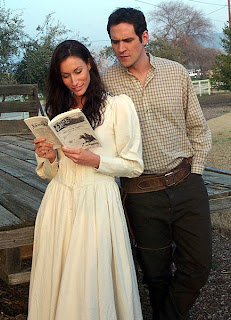Usually this catch all topic is left
for the end of a given process. But I'm not doing these blogs in any
particular order, and I'll likely come back to a topic more than
once. Today, I am driven by questions from some very kind readers. As
you will see by my detailed response, I am open to questions – even
if I've covered something before.
Improv vs Scripted
One very fine question was about the
script. Since web series are not as formal affairs as film or
television, and some web series have mentioned that much on the
screen is improv, why are we taking such painful care in writing the
Demonspawn scripts. The question is especially relevant when we have
a lead actor who is a very fine improv actor. Were I to hazard a
guess on why other shows use improv is that they are not paying for
sets or locations and they have unlimited access to them. The number
one reason I can't even consider improv as the main method of acting
in Demonspawn is that it takes a lot of time. Ten minutes of dialog per episode
is a lot to come up with on the fly even when everyone is on the same
page with their characters. It can take hours before one frame is
shot. Time is the biggest enemy in any shoot, because it is very
expensive. We will have one shot at each location for under the
typical 12 hours of time. I'd say that we'd have 8. We may have as
much as 10 if we're lucky. Some of that time will be eaten up with
setting up lights, make-up and wardrobe. The clock starts the moment
we all arrive in the parking lot.
That said, we aren't adverse to improv
at all. One of the best moments in shooting Demon Under Glass was
standing in the rain with Garett Maggart and Jason Carter re-doing
the whole scene where Simon snatches the caduceus (oh, yeah. We need
a new caduceus). And then there was re-writing the fight in the
isolation tank between Joe and Simon. We were in their trailer firing
ideas back and forth. It was really fun and very satisfying
creatively. I don't thins could have happened until the actors were
really familiar with their characters. That takes time with a script.
To refine the script and give the actors an opportunity for input on
the dialog, part of the budget will be allocated for table reads
(sometimes known as pizza reads) where we just see how the dialog
sounds being read by actors. Usually we find out there is too much
dialog. We also want to have rehearsals after the script has been
refined. This familiarity with the material will speed up the actual
shoots, but it will also make improv easier and more effective. The
actors will really know their characters having had more time in
their heads. It's great for the actors and makes the shoots run as
smoothly as possible. Contrary to popular opinion, actors don't like
to wing it. A lack of a script or the barest sketch of a script
indicates that the production doesn't have a clear idea of where they
want to go or how they are going to get there. SAG certainly won't
grant signatory status to a production that doesn't have a real
script.
Music
Another question has been what music
will we use for the series. Will we use the music from the film? Jon
says that each new project is an opportunity to do something
different. Thus, we will not be using the compositions written for
Demon Under Glass. In doing the cooking videos and chatting with
other web producers, I've discovered sites like
http://freesoundtrackmusic.com
that allows for the purchase of a limited license to original music.
Searches of this site can be made by composer, mood of the scene or
style of music. These licenses are specifically for Youtube. If we
take the project to a higher level of distribution, we can pay an
additional fee to keep those selections. There are several sites like
this. Each one has hundreds of compositions.
Miscellaneous
While searching for the music sites, I
ran across another kind of asset that we may make use of during the
Demonspawn shoot. There are companies that offer licenses to use
virtual sets. They are 3D computer generated environments into which
actors can be realistically composited. The licenses for these assets
are very reasonable (from $75 to $450). Fortunately, we are connected
to talented people who can do these kinds of composites seamlessly.
This gives us some options we hadn't considered for sets and some
vampire type FX.
One more question that has come up often is are the actors reading this blog. As of this date, all the actors currently involved in the web series have the link to the blog. I notify them when I put up a new post. Judging from the questions I've gotten back from them, they are reading the blog.
Until next time.





